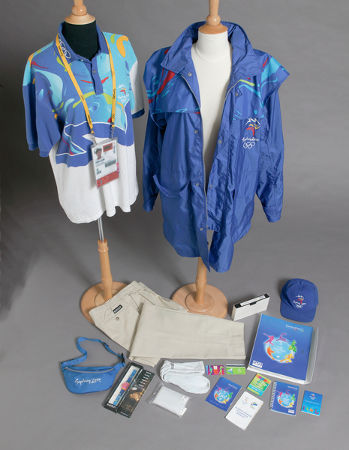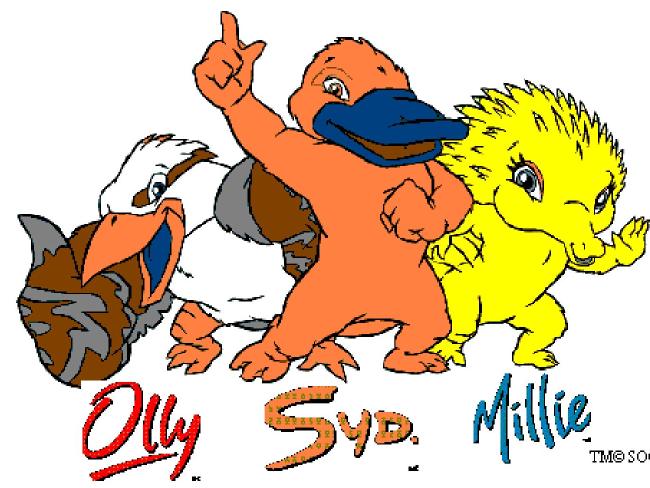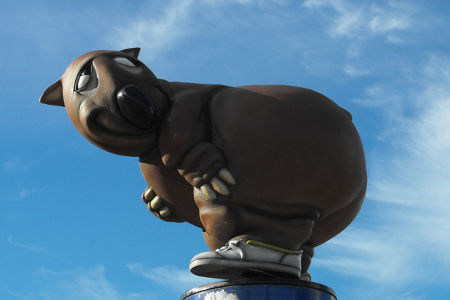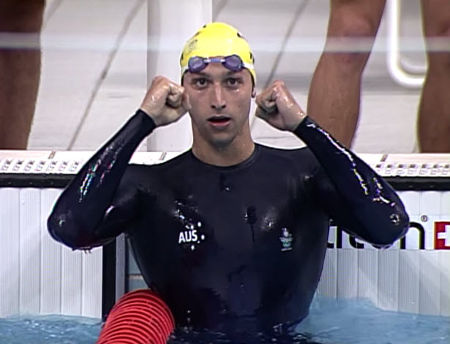Go You Good Thing: The 2000 Sydney Olympic Games Remembered, Fifteen Years On
It was Australia at our proudest, our daggiest, and our most hopeful. Never forget.
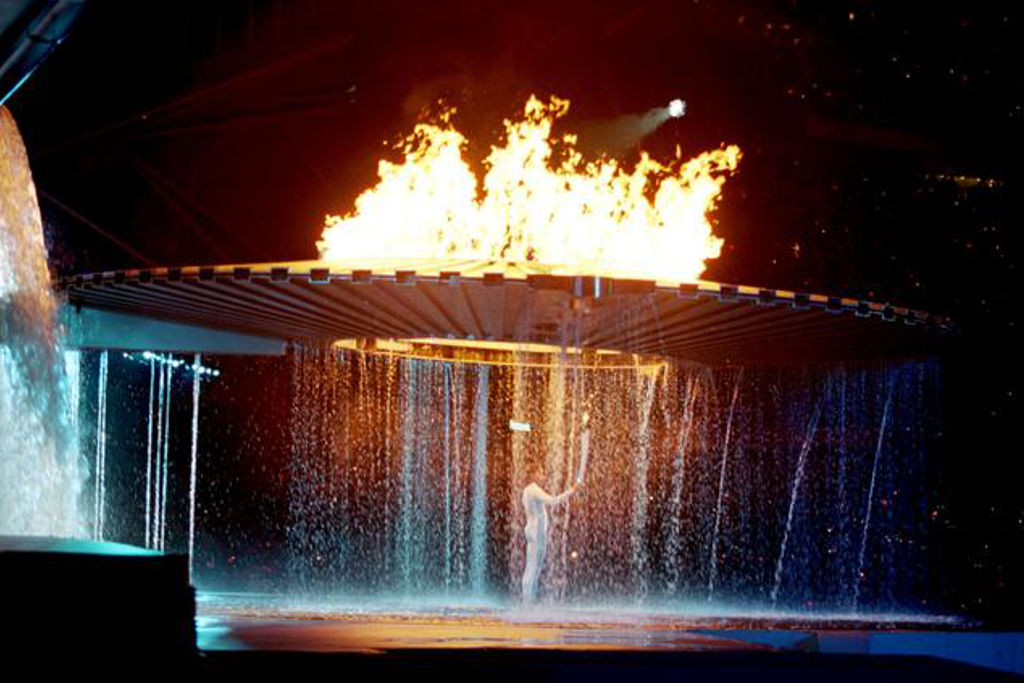
Fifteen years ago this week, Australia hosted the Olympic Games for only the second time in history. For sixteen days in September 2000, all eyes were on us as we delivered what IOC President Juan Antonio Samaranch would come to call “the best Olympic Games ever” — a title not bestowed on any other host city since.
But if the Sydney Olympics were a fun two-week diversion for most of the world, for us they were a lot more. As a nation, we fiercely pursued putting on an exceptional Games in a valiant attempt to prove Australia both to the outside world, and to each other. From the announcement that Sydney had clinched the Games in 1993 to the wrap-up of the Closing Ceremony, our earnest desire for people to notice and like us, our uncertainty in a rapidly changing world, our unrelenting dorkiness and our pride in our weird, offbeat culture were on full display.
At the Opening and Closing Ceremonies we presented a proudly daggy, loveable version of ourselves, and we got in just in time. Today the internet’s constant search for things to mock and parody might have deterred organisers from putting bizarre Australian creations like Hills Hoist tin-men, Kylie Minogue being carried into the stadium by a phalanx of budgie smuggler-clad surf life savers on a giant thong, and Savage Garden front-and-centre, but back in 2000 we were memeless and innocent enough to get away with it. Just.
Our Aboriginal history was put squarely and proudly in the middle of the celebrations, and the whole nation probably came to a stand-still just once in the sixteen days — to watch an Indigenous Australian woman run for her country and win a long-awaited gold, before draping herself in a red, yellow and black flag.
Looking back, The Games were memorable for so many reasons, but here are fifteen to get you started.
–
The Opening Ceremony
The opening ceremony, watched by around 3.6 billion people around the world, doubled in parts as an ‘Australia 101’ for foreigners on the one hand, and a national celebration of identity and history on the other. Over 12,000 performers were involved, including thousands of Sydney primary school students.
It also had stuff like this that, in retrospect, is both wonderful and utterly mystifying.
But the undoubted highlight was when 13-year-old Nikki Webster skipped onto the enormous, darkened stage of Stadium Australia, and gave that dazzling performance that would kickstart her long, storied career as an Australian icon (not really).
For Nikki, the Games were something of a peak before a long, slow decline: besides the hit single ‘Strawberry Kisses’ and the inexplicable ‘Best Of’ album follow-up, she didn’t get much in the way of long-lasting fame besides a couple of ZOO Magazine covers and her own dance studio on Parramatta Road in Stanmore.
–
The Volunteer Army, aka: The Games Force
There were 47,000 volunteers responsible for getting The Games together; everyone seemed to know someone who was a member of the Games Force, an extremely cuddly precursor to the Australian Border Force who had simultaneously much better and much daggier uniforms.
The names of all 47,000 of those volunteers are engraved on a series of immense pillars outside the Olympic Stadium, forever standing vigil to their service and as a backdrop for photos by tourists. The volunteers themselves have gone into retirement, but stand ever-ready to come to this nation’s aid should Australia require an army of incredibly-dressed pensioners. They even meet up sometimes to reminisce. It is very cute.
–
The Adorably Shitty Mascots
Remembering our native fauna mascots, Syd, Millie and Olly, is great for pub trivia if nothing else, as are the alternate names they were given by Roy and HG: “Millie, Olly and Dickhead.”
Given that they’re literally just three cartoon animals, their originality as mascots was roughly equivalent to the latest generation of Pokemon. But when you compare them to their counterparts from other Olympics, like the mascots Powder, Copper, and Coal at Salt Lake City in 2002 or the bug-eyed penis nightmares from London 2012, you realise it could’ve been a lot worse.
–
Roy, HG, And The Dream
Every night of the Games, after the day’s events had wrapped up, Roy Slaven and HG Nelson would take anchor on Channel 7 to recap the day’s events, interview local and international stars, and rip on absolutely everything. Between their interviews of clearly baffled foreign athletes, their hilarious commentary of the gymnastics, weightlifting and water polo events and their relentless dick coverage, The Dream still stands the test of time.
And who could forget their unofficial mascot of the Games…
–
Fatso The Fat-Arsed Wombat
More than any other figure, Roy and HG’s Fatso the Fat-Arsed Wombat is the great forgotten hero of the Sydney Olympics. When The Battler’s Prince wasn’t competing in the official mascot bombing competition, he was being smuggled into medal ceremonies by Australian athletes despite an official directive not to courtesy of the Australian Organising Committee.
Despite that mild controversy, Fatso was the undisputed king of those sixteen days — a Fatso plush went at a charity auction for more than $80,000, courtesy of 7 executive chairman Kerry Stokes, and a Fatso statue had pride of place outside the Olympic Stadium for years afterward until it was stolen by some reprobate in 2010.
–
Cathy Freeman
Freeman’s two big moments during the Games supplied the most iconic images of the entire event: first, the lighting of the Olympic flame; and second, claiming the gold medal in the 400-metre final.
But the aftermath of that spectacular win arguably inspired a moment of more lasting importance when Freeman draped herself in the Aboriginal flag, as she’d done on a number of previous occasions after big wins. The Games saw several displays of pride in Aboriginal culture and identity that weren’t in the official script — in a dig at then-Prime Minister John Howard, Midnight Oil performed ‘Beds Are Burning’ in ‘Sorry’ shirts during the Closing Ceremony.
Freeman’s waving of the Aboriginal flag was technically a breach of the Olympic charter, which only permits national flags during celebrations. But no one really seemed to care — by contrast, an Indigenous Australian athlete demonstrating pride in their heritage was met with overwhelming acclaim. Even Howard, who criticised Freeman for doing the same after winning gold at the 1994 Commonwealth Games, had enough sense to keep his mouth shut this time around. Puts 2015 to shame, to be quite honest.
–
Smashing The USA Swim Team Like Guitars
There are few greater Australian pastimes than pissing all over America, and a fantastic opportunity for doing just that presented itself in the lead-up to the 2000 Games, when Gary Hall Jr. of the American team for the 4×100 metre men’s swimming final promised they would “smash [the Australian team] like guitars”.
The race speaks for itself. Trust me.
–
Our Ian. Just Our Ian, Everywhere, All The Time, Forever.
Thorpe was 17 years old at the time of the Sydney Olympics. He couldn’t vote or buy a beer, but he won us about 20 percent of our gold medals, as well as two silvers, making him the overall top medalist of the Games.
He was charming and gracious and everything you could want in a national representative. Since then Thorpe has struggled with mental illness, his sexuality and a fickle media, but has remained an upstanding young bloke who you could introduce to your mother, no problems. As Annabel Crabb wrote earlier this year: “How much we have asked of this man. How rarely he has disappointed us.”
–
Matt Shirvington And His Famous Balls
Let’s just put this bluntly: Shirvo’s balls were a national spectacle.

Good Lord.
Oh yeah, and he ran pretty well too.
–
Eric The Eel For President
Eric “the Eel” Moussambani needs no introduction. A generation of Aussie kids grew up with Equatorial Guinea’s most iconic swimmer as a beacon in their minds, a hero for the ages.
Eric made it to the Games despite never having swum in an Olympic pool before, and he captured the hearts of Australians in his three-man heat — which quickly became a one-man heat after his two competitors were disqualified for a false start. Eric managed the 100m freestyle in one minute and 52 seconds — a time which Roy and HG correctly declared “the Equatorial Guinea record”. The footage of that swim, and of a whole stadium rising as one for the plucky Equatorial Guinean, is truly one of the great moments in sporting history.
–
Sydney, She Glowed
Fifteen years ago, Sydney was affordable, loveable, and spread out. Games public transport was notoriously fantastic for the first time in the city’s history since they ripped up all the tram lines for no reason, and despite the failed ambition to get electronic ticketing done in time (we got around to it a quick 14 years later), the city just worked.
Circular Quay was home to a huge screen, where rolling Olympics coverage was played. Also, the amazing fireworks displays around the Sydney Harbour Bridge for the Opening and Closing ceremonies were once-in-a-lifetime and definitely can’t be experienced roughly every time Sydney has a big event on, has a New Years Eve party or just has a shitload of pretty boomsticks to let off for no reason.
–
Aussie Music Legends Going All Out
From the now-inexplicable popularity of Vanessa Amorosi to Men at Work‘s banger of a ‘Land Down under’ remix to a Channel 7 newsreader solemnly declaring that Jimmy Barnes‘ voice “would test the walls of Jericho themselves,” the Games was a showcase of Australian music at its finest and its most ridiculous.
But arguably topping them all came John Farnham, who closed the final episode of The Dream with a legendary rendition of ‘Go You Good Thing’. What a song. What a country.
–
Jumping Jai Taurima
Little-known Queenslander ‘Jumping’ Jai Taurima surprisingly jumped a huge 8.49 metres to snatch the Silver medal in the men’s long jump and create an Australian record that would stay for 11 years.
Far more importantly, though, he rocked a pair of speed dealers like a motherfucker. Former Prime Minister Tony Abbott would be proud.
–
The Closing Ceremony
At some point in late ‘99, I imagine, a bunch of Games officials huddled together in a room, drawing up final plans for the Closing Ceremony. They started to put together the guest list over a coffee, and someone got worked up and refused to take part — unless the ceremony included Paul Hogan, Greg Norman, and the Bananas in Pyjamas dancing together to a sick dance remix of ‘Land Down Under’ by Men At Work.
That person is a national hero and should be immortalised in marble on the Opera House forecourt.
–
Just How Bloody Good Everything Was
All kidding aside, the Sydney Games were the best ever and if you disagree I may fight you. Bob Carr will remind anyone who comes near him that he was NSW Premier during the Best Games Ever, even casually sledging the London 2012 games while he was Foreign Minister.
The Olympic Park site at Homebush now sees the Royal Easter Show and football seasons come and go, year after year, but if you walk around the Games site these days you get a real feeling that no other event will be held there that will come close to rivalling the Olympics.
Many countries don’t even want to host the Games anymore, citing the huge costs and risks involved. Beijing won the 2022 Winter Olympics bid off only one other nominee, and the IOC is finding it increasingly difficult to lure potential host cities into putting their hands up. But in 2000, the Olympics were a big thing, and they were well and truly ours.
Just one year after the Games ended, September 11 struck, and Australia lost a huge amount of our collective innocence with the “children overboard” controversy, and the introduction of the inhumane Pacific Solution. The years following brought the Bali bombings, our involvement in the Iraq War, and Mark Latham — and by the mid-noughties, we were a Properly Grown Up Country with our own set of political cynics, allegiances, and “national security” concerns.
As a point of particular significance, it’s marvellous to think our two biggest heroes of the 2000 Olympics were a proud Indigenous woman from Queensland and a bashful high school kid from Western Sydney. We pulled off the Games in supreme style and we proved that we could bloody well put on a huge, global event. The Olympics may be gone, but heroes live forever.
–
Mike de Waal is a born-and-bred Sydney-based writer. Mike tweets at @michaelrdw.
–
Feature image via Australian Olympic Committee.
